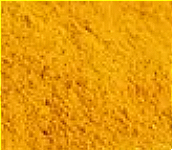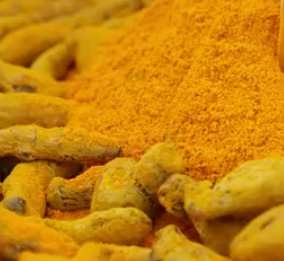Check the ingredients!
... live healthy!


| "Descrizione" by Frank123 (12008 pt) | 2023-May-25 19:14 |
| Evaluation | N. Experts | Evaluation | N. Experts |
|---|---|---|---|
| 1 | 6 | ||
| 2 | 7 | ||
| 3 | 8 | ||
| 4 | 9 | ||
| 5 | 10 |
Turmeric oleoresin is a natural extract obtained from the root of Curcuma (Curcuma longa L.), a perennial plant belonging to the Zingiberaceae family. It is extracted using acetone, ethyl acetate and/or hexane and then purified using isopropanol or ethyl acetate or solvent mixtures (isopropanol/ethanol or ethyl acetate/hexane). The solvents are removed under vacuum. The composition is generally 90% curcuminoids (the active ingredients as the sum of curcumin, desmethoxycurcumin and bis-desmethoxycurcumin.
It appears as a yellow-orange powder.

L'oleoresina di curcuma si ottiene attraverso un processo di estrazione con solventi per separare i componenti attivi dalla radice di curcuma. L'estratto risultante contiene una maggiore concentrazione di composti bioattivi rispetto alla semplice polvere di curcuma.
Il principale principio attivo dell'oleoresina di curcuma è la curcumin, which gives the characteristic yellow-orange colour and potential antioxidant, anti-inflammatory and antimicrobial properties.

A cosa serve e dove si usa
Alimentazione
L'oleoresina di curcuma è comunemente utilizzata nell'industria alimentare come colorante, aromatizzante e additivo naturale per diversi prodotti alimentari, come condimenti, salse, snack, prodotti da forno e bevande.
Cosmetics
It is also used by the cosmetics industry and in skin care products for its antioxidant properties.
It is important to note that, as with all natural extracts, the concentration of active ingredients in turmeric oleoresin may vary depending on the extraction process and the source of turmeric used.

| Evaluate |